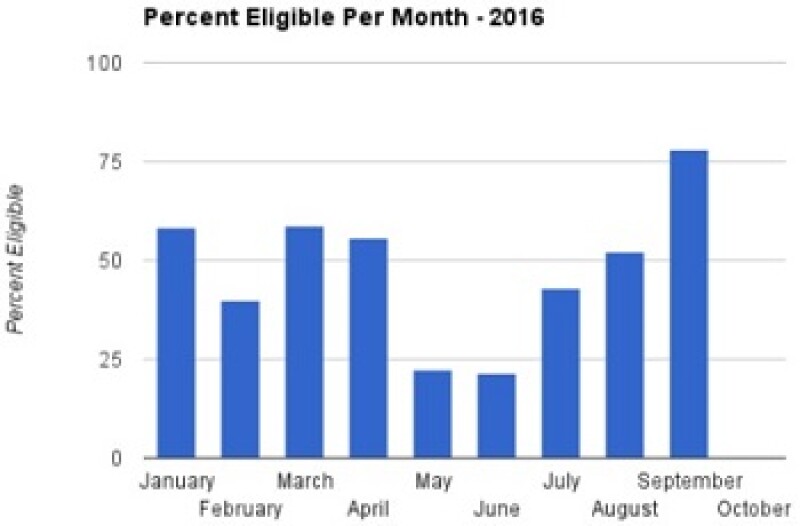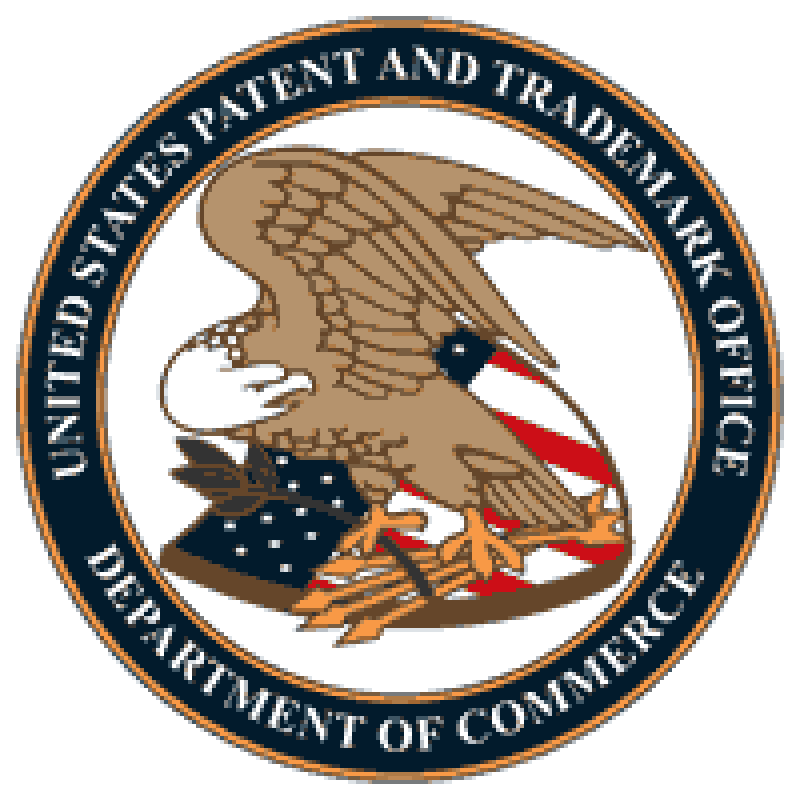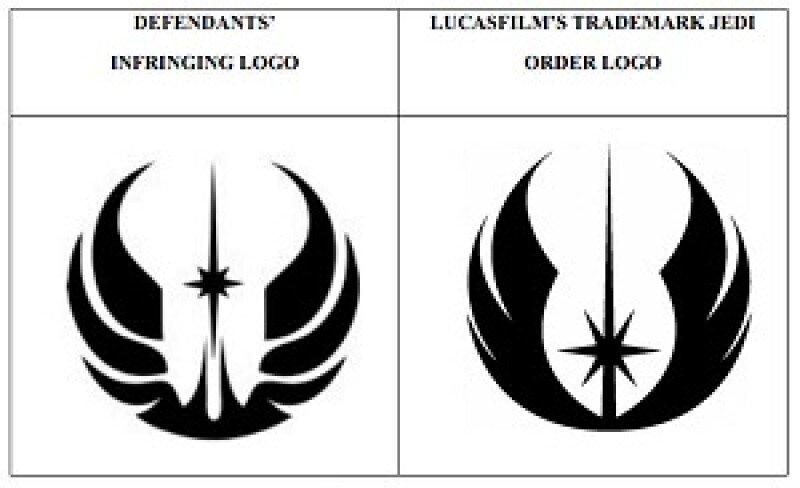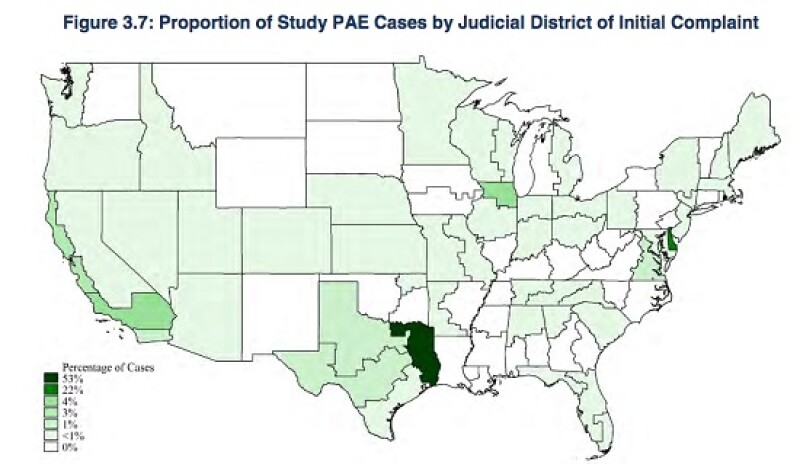Also on the blog in the past week were:
PTAB most active forum for US patent disputes
We’ve also posted the following articles in the past week (log in via subscription or free trial):
Samsung v Apple analysis: design patents put to the test at Supreme Court
U-Haul to pay PODS $41m trade mark settlement
Little impact from PTAB testimonial evidence so far
Appeal dismissed in pregabalin patent case
Q3 US patent litigation data and analysis
CJEU clarifies copyright exhaustion in Microsoft case
Samsung v Apple SCOTUS arguments: Tests proposed for "article of manufacture"
A good month for patent eligibility
McDonnell Boehnen Hulbert & Berghoff’s Patent Docs blog ran an article suggesting it is now easier for district courts to find that claims are not ineligible at both the pleadings and post-discovery stages. Three Section 101 holdings from the Federal Circuit this year finding software claims patent-eligible appear to have loosened up the application of 101 by district courts.

The article examined 141 distinct cases, of which claims were found eligible 73 times and ineligible 68 times, giving an eligibility rate of 51.7%. “Thus, it appears as if, in 2016, patents are being found eligible in a higher percentage of cases than previously,” it said. September was the best month for patentees this year. The court ruled in favour of the patentee in 78.2% of cases – 18 of 23. Twenty of these cases were decided on the pleadings (with a 75% success rate) and three were decided after discovery (100% success rate).
“The majority of the § 101 decisions in September, and throughout the year, were made on the pleadings,” said the article. “Prior to September, the patentee success rate on the pleadings was hovering around 44%. As noted above, this increased to 75% last month. Thus, the main driver of the high rates of eligibility in September was decisions made on the pleadings.”
The law firm gave some explanations for this: Enfish and McRo making it harder to invalidate a patent before discovery, patents post-Alice undergoing a higher level of vetting by patent owners and post-grant review proceedings weeding out some of the weaker patents before district courts have a change to complete.
USPTO asks for input on eligibility – again
Speaking of patent eligibility, the USPTO has announced that it will be holding two roundtables in November and in December as part of an effort to solicit input from the public regarding the legal contours of patent subject matter eligibility.

USPTO director Michelle Lee commented: “Our goal is to minimise any uncertainty in the patent system by ensuring we not only continue to apply the statute and case law in this area as faithfully as possible, but also understand the impact of the jurisprudence on innovation by assessing what, if any, changes might be helpful to further support innovation.”
In a notice published in the Federal Register, the USPTO announced the first roundtable will be held November 14 at the USPTO headquarters in Alexandria, Virginia. This roundtable will focus on the USPTO's continuing efforts to seek input from across the country and across industries on how the USPTO can improve the agency’s subject matter eligibility guidance and training examples.
The USPTO will host a second roundtable on December 5 at Stanford University in Stanford, California.
“Together, these roundtables will help facilitate discussion on patent subject matter eligibility in view of several decisions in recent years by the courts,” said the USPTO.
The trade mark lawsuit awakens

Lucasfilm has sued the New York Jedi Club and associated Lightsaber Academy in the Northern District of California, reports TorrentFreak.
“Defendants are in the business of promoting, producing, offering for sale and selling unauthorized ‘Lightsaber’ classes, which purport to teach students how to use ‘Lightsabers’ and/or perform as ‘Jedi’,” says the complaint.
Lucafilm is the trade mark owner for “Jedi” and “Lightsaber”. It also accuses the defendants of using a logo that is nearly identical to the Jedi Order logo (see right).
Another Supreme Court patent case?
The US Supreme Court could be set to add another patent case to its docket. The government last week recommended that the court review Impression Products v Lexmark International, reports SCOTUSblog.
The case centres on the issue of the scope of the patent exhaustion doctrine and involves toner cartridges used in laser printers.

Impression Products asks two questions in its petition:
1. Whether a “conditional sale” that transfers title to the patented item while specifying post-sale restrictions on the article’s use or resale avoids application of the patent exhaustion doctrine and therefore permits the enforcement of such post-sale restrictions through the patent law’s infringement remedy.
2. Whether, in light of this Court’s holding in Kirtsaeng v John Wiley & Sons (2013), that the common law doctrine barring restraints on alienation that is the basis of exhaustion doctrine “makes no geographical distinctions,” a sale of a patented article – authorised by the US patentee – that takes place outside of the US exhausts the US patent rights in that article.
As SCOTUSblog’s Amy Howe reports: “In his brief on behalf of the federal government, Acting Solicitor General Ian Gershengorn urges the court to take on both of the questions presented by Impression’s petition. First, the government’s brief contends, the Supreme Court has long held that when a patent holder sells (or authorizes the sale of) a patented product in the United States, the patent laws do not restrict the subsequent sale of the product. This is true, the government argues, even if – as here – a patent holder like Lexmark has put limitations on the post-sale use or resale of the product as part of the terms of the sale. The Federal Circuit’s decision to the contrary, the government tells the justices, ‘would substantially erode the exhaustion doctrine’.”
Regarding the second question, the government says the Federal Circuit was wrong to hold an overseas sale never exhausts US patent rights in the patented product. But it added that Impression’s argument that an authorised overseas sale always exhausts US patent rights is equally wrong.
Patent forum shopping petitions
Amicus briefs are being filed in support of another Supreme Court petition, this one urging the an end forum shopping in patent cases.
TC Heartland has asked the Supreme Court to review the law that allows such a high concentration of patent cases in one district. Electronic Frontier Foundation and Public Knowledge last week filed an amicus brief in the case.
“In our brief in support of TC Heartland’s petition for certiorari, we argue that the Federal Circuit’s rule is fundamentally unfair and undermines the very purpose of the venue statutes,” explains EFF’s Vera Ranieri in a blog post. “The brief also details how the rule has significant, substantive effects on cases that, without correction, will continue to create ongoing harms. We’re not the only ones that feel the Federal Circuit law is due for review. TC Heartland has also received support from 32 Internet companies, retailers, and associations as well as the Washington Legal Foundation.”
In addition, this week 56 law professors including Mark Lemley, Brian Love, Colleen Chen and Arti Rai filed an amicus brief in support of the petition.
The FTC's report on patent assertion entities released earlier this month revealed that 53% of the studied cases were filed in the Eastern District of Texas.

In brief
- Qualcomm has taken it patent dispute with Meizu to the International Trade Commission, even though the Chinese smartphone maker does not sell into the US yet, reports San Diego Union-Tribune. It also filed a complaint in Germany and an infringement seizure action in France. In June, Qualcomm filed lawsuits in China against Meizu alleging patent infringement and refusal to negotiate a patent licence with Qualcomm.
- The number of craft beer trade marks registered in the UK hit a record high in 2015, reports The Grocer. The 1,666 beer trade marks registered was up 12% on 1,485 in 2014.
- Many people are surprised to learn that Hillary Clinton was an intellectual property attorney when she practiced law from 1977-1992 for the Rose Law Firm, reports Foley & Lardner. There are at least three reported court decisions on which she is named as counsel.










